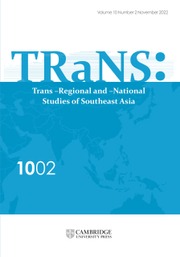Important but De-centred: ASEAN's Role in the Southeast Asian Human Rights Space
Published online by Cambridge University Press: 21 December 2016
Abstract
In this article, I argue that to capture ASEAN's importance in the promotion and protection of human rights requires embedding the analysis of what ASEAN says and does into an awareness of the broader human rights space of which it is a part. The Southeast Asian human rights space has four dimensions: ASEAN, domestic institutions, civil society, and the global United Nations system, all of which are increasingly linked together in a complex whole. Revealing this human rights space suggests three conclusions. First, ASEAN is important as an educator, enabler, standard setter, and mobiliser of human rights, often despite its flawed institutional design. This importance is the product of its own activities and how it is used by other actors. Second, ASEAN member states engage with each other on questions of human rights broadly, and not only through ASEAN, which illustrates the limits and resilience of the ‘ASEAN Way’ as a set of procedural norms. Third, ASEAN, despite its growing importance to human rights promotion, has become increasingly de-centred in that field, with serious consequences for its own security agenda.
- Type
- Articles
- Information
- TRaNS: Trans-Regional and -National Studies of Southeast Asia , Volume 5 , Special Issue 1: ASEAN communities , January 2017 , pp. 99 - 119
- Copyright
- Copyright © Institute for East Asian Studies, Sogang University 2016
References
- 8
- Cited by


